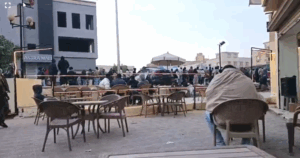OCHA ‘deeply concerned’ about West Kordofan and Blue Nile state violence
The Humanitarian Coordinator of the UN Office for the Coordination of Humanitarian Affairs (OCHA), Eddie Rowe, expressed his deep concerns about the situations in Lagawa, West Kordofan, and Wad El Mahi, Blue Nile state, and appealed for peace and an end to the violence in a statement published yesterday.
 People fleeing to Ed Damazin in Blue Nile state last month (social media)
People fleeing to Ed Damazin in Blue Nile state last month (social media)
The Humanitarian Coordinator of the UN Office for the Coordination of Humanitarian Affairs (OCHA), Eddie Rowe, expressed his deep concerns about the situations in Lagawa, West Kordofan, and Wad El Mahi, Blue Nile state, and appealed for peace and an end to the violence in a statement published yesterday.
“Fighting in West Kordofan and Blue Nile states risks further displacements and human suffering in addition to the almost 65,000 who were already displaced and leaving 149 people dead and 124 injured due to violence in Blue Nile in July 2022. There is also a risk of an escalation and spread of the fighting with additional humanitarian consequences,” the Humanitarian Coordinator warned.
'There is also a risk of an escalation and spread of the fighting with additional humanitarian consequences'
Rowe wants to remind "all parties to the conflict to comply with their obligations under international humanitarian law" and ensure the protection of civilians and civilian infrastructure, including health facilities, schools, and water systems.
Because of ongoing violence, the areas are difficult to access for humanitarian organisations so Rowe also urged all parties to the conflict to enable the free and safe movement of displaced people "in search of safety and assistance".
He reiterated that humanitarian organisations "stand ready to aid people affected by the conflicts" and explained that unimpeded humanitarian access is urgently needed.
West Kordofan and the Nuba Mountains
In Lagawa tensions escalated between the Misseriya and Nuba tribes on October 10 after a land ownership dispute. At least 36,500 people have reportedly fled Lagawa as violence continues. The government’s Humanitarian Aid Commission in West Kordofan reports that so far at least 19 people have been killed and 34 injured during the conflict, OCHA writes.
The hostilities began after a dispute at Gangaro village, approximately three kilometres east east of Lagawa. On 13 October, the Misseriya tribesmen claimed the land, which led to an exchange of gunfire between the Misseriya and local Nuba in the market in Lagawa itself, which continued through 14 and 15 October, Radio Dabanga reported.
Following the inter-communal clashes, the Sudan Armed Forces (SAF) and the Rapid Support Forces (RSF) accused the Sudan People's Liberation Movement-North (SPLM-N) of shelling the area. The SPLM-N vigorously denied the accusations of shelling Lagawa.
The eastern part of West Kordofan and the Nuba Mountains, an area of hills located in South Kordofan, are home to a number of indigenous ethnic African groups collectively known as Nuba. West Kordofan is also populated by the Misseriya.
The SPLM-N has fought against Omar Al Bashir's dictatorship, which heavily repressed the Nuba people and was always in support of Arab herding tribes whilst looking down on 'African' tribes, often sedentary farmers.
During the dictatorship of Omar Al Bashir, the Misseriya were supported by Bashir's National Congress Party (NCP).
Nuba residents fear that South Kordofan’s Nuba Mountains will become a ‘second Darfur’ as farmers continue to face attacks by militant herders.
In Darfur, a genocide has taken place against indigenous farmers by militant Arab herders supported by the regime of ousted dictator Omar Al Bashir. As Janjaweed militias, they killed many African farmers. In recent years, attacks by herdsmen against Darfur’s farmers and non-Arab herding groups have continued, resulting in many deaths.
Blue Nile state violence
In Wad El Mahi, near El Roseires in Blue Nile state, inter-communal violence renewed on October 13. "As fighting continues, at least 1,200 people have been displaced and an unconfirmed 170 people have been killed and 327 have been injured", OCHA writes in its latest update.
As a result of the conflict, the wali (governor) of the Blue Nile state issued a decree prohibiting the movement of civilians using trucks within big parts Wad El Mahi locality. "This restriction to freedom of movement prevents people from seeking safety and accessing life-saving services, thereby endangering their right to life," OCHA states.
'Restriction to freedom of movement prevents people from seeking safety and accessing life-saving services, thereby endangering their right to life'
According to unconfirmed reports, two people from El Hamaj tribe were killed in a land dispute in Wad El Mahi locality on October 13, which led to clashes between the Hausa community and other tribes. Mohamed Moussa Ibrahim, a Hausa leader in the area, told Radio Dabanga that thousands were displaced from Wad El Mahi, most of them being “old people, women and children”.
The intercommunal violence that erupted in mid-July between Hausa, Berta, El Hamaj, and other ethnic groups in the northern part of Blue Nile state, which left at least 105 people dead and caused thousands to flee to the state's capital Ed Damazin and safe parts of El Roseires, has flared up before. In September, at least 24 people were killed as the violence resurfaced. At 149 people died before October 6, according to OCHA.











 and then
and then